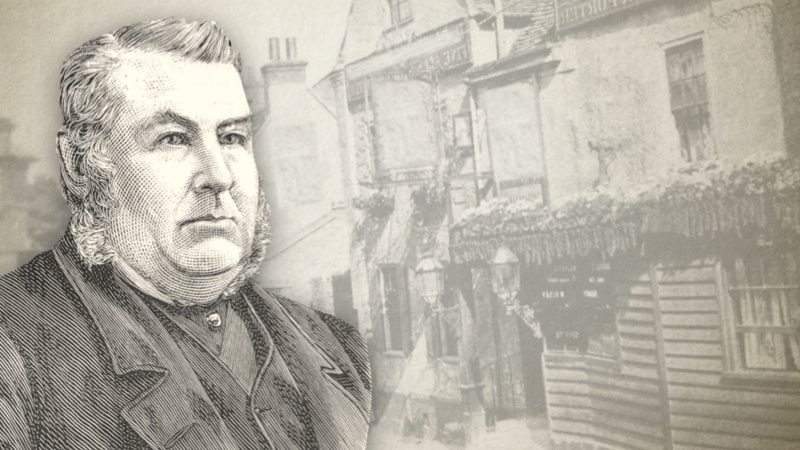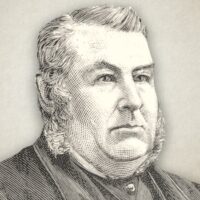
The Life And Ministry Of Josiah Crutcher
Earthen Vessel 1888:
Our readers will unite with us in our expressions of grief at the demise of our highly esteemed brother in Christ, Josiah Crutcher, which took place Oct. 2, 1888, in his 65th year. At the funeral on Monday, Oct. 9, the greatest possible respect to the memory of the deceased was shown at The Grove, Camberwell. The pulpit was becomingly draped in black, avd all the occupants of the body of the chapel were in mourning attire, as also were many in the gallery. Our godly brother, Mr. Thomas Bradbury, conducted the service amid unmistakable signs of emotion and sorrow, and expressions of joy, on account of the happy departure of his highly-esteemed and faithful friend and co-worker, Josiah Crutcher. With faltering lips Mr. Bradbury read suitable portions of Scripture, and poured out his heart in solemn prayer, telling the Lord of the loss the Church of Christ, the widow, the family, and he himself had sustained by this visitation of divine Providence, and of the great gain to the soul of the departed. Never did we listen to a prayer so solemn, so sweet, so savoury, so suitable to such an occasion; it was so earnest and sacred that many were moved to tears, some audibly so, that we were constrained to say, “Surely the Lord is in this place!” As our dear brother lingered at the throne, the solemnity increased, and a sacred feeling pervaded the whole assembly. Mr. Bradbury, in addressing the friends, founded his remarks upon John 14:2, “In My Father’s house are many mansions,” said this is a solemn occasion, one of God’s children, bought by the precious blood of Christ, is now in the mansion prepared for him. At one time it was my impression that I could not stand before you on this occasion, but being fully persuaded that our brother, Josiah Crutcher, is now before the throne, in the strength of the Lord, I am able to do so. Our brother stood before us as a man in Christ. My first sight of him won a place for him in my heart’s affections. We were for awhile separated, but the time came when we were brought together in the communion and fellowship of our Lord Jesus Christ, the fellowship of His sufferings. For fourteen years we travelled on together. As to the state of our brother now before the Lord we are certain he is happy. On my return from the country recently, when I heard of our brother’s illness, I went and saw him immediately, and read and prayed with him. It was a sacred time. It seemed to us to be the very gate of heaven. One hymn, commencing, “I’ll praise my Father while I’ve breath,” was on his lips for days, and he was kept in a happy state for about a month. At one time he said, “Here lies one whose only hope is in electing love, predestinating grace, quickened by the Holy Ghost.” The last time I went he said, “I have had many reckonings up.” I said, this does not affect your state before God. “No,” he replied, “the covenant of God stands sure, and nothing can alter it.” Mr. Bradbury concluded his brief but touching address by saying, May you and I be enabled to follow him as he followed Christ, who through faith and patience now inherits the promises.
At the conclusion of the service in the chapel, the cortege, consisting of a hearse and thirty carriages, wended its way to Nunhead Cemetery, where about 1,500 people had assembled, and an impressive address was delivered by Mr. T. Bradbury, and prayer was offered by Mr. C. Cornwell.
The Surrey Tabernacle was largely represented at the funeral, among whom we noticed Messrs. Albert Boulden, Green, and T. King. The deputation from the Aged Pilgrims’ Society (of which Committee Mr. Crutcher had been a useful member for seven years), were Messrs. Parks, Martin, Sharpe, J. E. Hazelton, and W. Jackson. The hymns chosen were given out by Mr. Cornwell. Among the large concourse of people we noticed Messrs. Harsant, Parnell, Noyes, Wheeler, and several other ministers and friends from most of the Strict Baptist Chapels in London, who held the departed in high esteem. As a denomination the Strict Baptists will greatly miss Josiah Crutcher, as he was very kind in taking the chair at many public meetings in our chapels.
Our own testimony of our deceased friend is that he was a Christian, a man, upright, clear, bold, frank, and ever willing with a cheerful heart to render help to the needy.
John Waters Banks
A Letter To Mrs. Crutcher, By Mr. A. Miller
Dear Mrs. Crutcher,—As you have expressed a wish that I should put down a. few things respecting your dear husband and my intimate friend, now before the throne (a friend of over twenty-four years), I willingly comply. We first knew each other from attending the ministry of Mr. Jesse Gwynnell, of Greenwich, and became neighbours about the year 1864, when our unfeigned friendship commenced. I have often heard him refer to his early days, how he was born of godly and praying parents at Warfield, near Windsor, on Dec. 24, 1823, and how he was called by grace in early life, when attending the chapel at West-end, Chobham, where you first became acquainted with him by spiritual and natural ties, and baptized together by Mr. Henry Allnut, of blessed memory. His call by grace was not so marked as yours (so he has told me), but was to him almost imperceptible, as expressed in Mark 4: 26-29, “So is the kingdom of God, as if a man should cast seed into the ground, should sleep and rise night and day, the seed spring and grow up, and he knoweth not how.” In him there was the blade, ear, the full corn in the ear, gathered to his eternal home. Yes, he died in faith, saw and embraced the promises, and confessed that he was a stranger and pilgrim, seeking and desiring a better and heavenly country. How precious was that hymn to him, commencing—“We’ve no abiding city here.”
He has often related to me his first coming to London. He had previously read a sermon of the late Mr. Joseph Irons, and how he wished he could sit under that dear man’s ministry, and his wish was granted a.bout the year 1849. Divine providence ordered and brought him with you to Dulwich, where you both were privileged to attend at the Grove Chapel, and where you also became connected with the little Baptist cause at Norwood, until the Lord ultimately brought you to Pomery-street,
Hatcham, where our first intimacy commenced. .After the death of di,ar Jesse IJ:wynnell, and the sale of the chapel, our steps were directed to the Grove, Camberwell, where the ministry of the late Mr. Jay was made a blessing to our souls, and where our dear departed friend was called to take an active pa.rt, and was the first instrumental cause of the settlement of our much esteemed minister, Mr. Thomas Bradbury, as pastor of Grove Chapel.
I need not enumerate the many ways in which he was made preeminently useful. He is embalmed in the hearts of the pastor, Church, and congregation of Grove Chapel as a faithful servant of the Lord there for the last fifteen years. His work is done, and he now realises what he so much desired, as his last audible words indicated, “Going home.”
I would only add, the first time I sat by his bed-side, he addressed me as follows:—“Miller, I have no high-flown ecstatic joys as some have had, but I am resting upon those firm foundation truths that I have believed in and received covenant realities from. Tell all my friends this when I am gone.” I felt when he uttered these words they were prophetic of his departure. I never expected that he would be raised up again.
We mourn his absence, which is his gain. May the Lord give us, when our last sands shall sink, to realise the blessing couched in his last words, “Going home.” So prays—
Your Christian friend and brother,
Aaron Miller
Josiah Crutcher (1823-1888) was a servant of Christ in alignment with the teachings of the Strict and Particular Baptists. For the last fifteen years of his life, he was a member (deacon) of Grove Chapel, Camberwell, during which time Thomas Bradbury was appointed pastor. Mr. Crutcher was actively involved in Strict Baptist activities, earning the respect of all who knew him.



